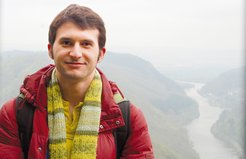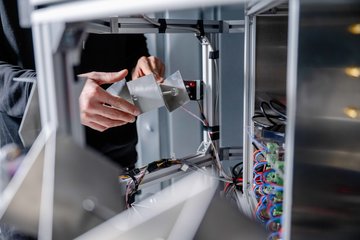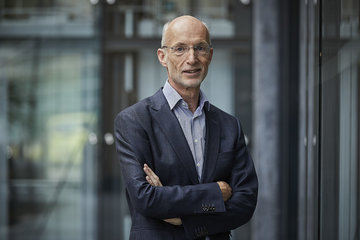Making life more predictable
Iranian Adrin Jalali conducts research in the field of computational biology for his doctorate at the Max Planck Institute for Informatics. He recounts what it was like for him to move from a city with several million inhabitants to a small town in Germany, and why he never wants to return to Tehran.

When I chose the Max Planck Institute for Informatics for my doctoral work, I had no idea where it was located. Unlike Tehran, a city with a population of almost 16 million, Saarbrücken is certainly no bustling metropolis. But that has its advantages: it helped me a great deal with settling in, because you always see familiar faces wherever you go - on the street, in shops or when going for a night out .... What’s more, the inhabitants of Saarbrücken are very open-minded and tolerant. Due to the fact that the town lies just seven kilometers from the French border, it is quite international, and the residents are very accustomed to meeting people from different cultural backgrounds.
I often take trips to nearby cities in France; even Paris is only two hours away by train. Whenever I travel there, I notice how much I’m already used to the way things are done in Germany. I greatly appreciate German dependability and punctuality, for example. I am also very comfortable with the fact that Germans are so rational and direct. Unlike in Iran and Canada, where I lived before moving here, most people here tell you quite bluntly what they think. I like that, because it means you know where you stand.
However, the situation here is by no means perfect. Germany does have one of the best social security systems, and in fact that was one of my motivations for choosing this country. But as a foreigner, you have to make sure you’re not put at a disadvantage. Not knowing enough about the system, I ended up having a stipend that needs to be renewed annually. While this covers my living costs, I’m disappointed that I can’t pay into the social security system. That’s really important to me - not only to benefit from, but also to contribute to a system of solidarity that I endorse politically. Furthermore, newcomers to Germany quite often become victims of prejudice. Some people mistake cultural differences or language difficulties for signs of scientific incompetence.
However, I rarely come across such attitudes at our Max Planck Institute. The people in our group come from many different countries, yet we work together perfectly as a team. And the scientific work here is really great! It’s a fascinating challenge to be involved in improving cancer treatment by developing computational tools.
People sometimes ask me whether I miss Iran and life over there, but apart from family and friends, I really don’t miss anything at all. On the contrary: I can’t imagine going back after what I experienced there. In Tehran, I spent 105 days in jail as a political prisoner - initially 11 of us were detained in a confined space that was so small that we couldn’t even lie down to sleep. Unlike numerous others who were sentenced to many years or even life in prison, or unlike a friend of mine, Jafar Kazemi, who was hanged, I was fortunate and was acquitted in the end. But I wouldn’t risk being arrested a second time. Life in such a system is absolutely unpredictable, and I know that the authorities are still extremely suspicious. At least I can occasionally meet up with my family in Turkey, as we are all able to travel there without a visa.
I want to stay in Germany for good - either in Saarbrücken or in another city. And, ideally, I would like to continue working in science, because it’s important to me that my work is openly available for public benefit rather than having it remain a trade secret locked away behind closed doors. As soon as I moved to this country, I started learning German. It’s tough, but I’m beginning to notice that I’m slowly making progress. Unfortunately, I’m not yet proficient enough for German literature. Reading the works of Marx and Hegel in the original version - that’s my goal.












